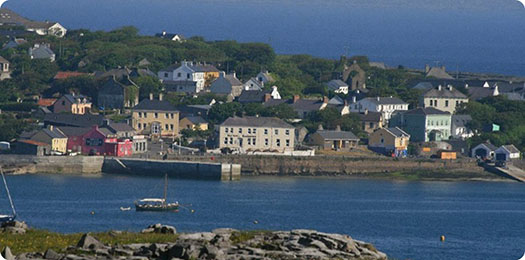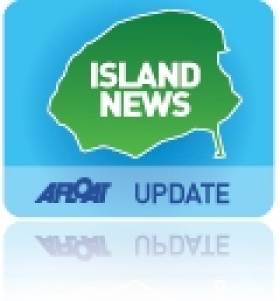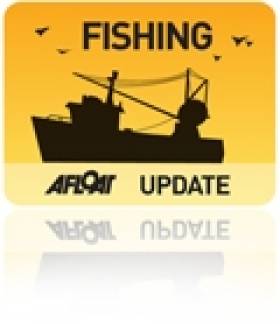Displaying items by tag: Aran Islands
Galway Bay Fish Farm Plans Withdrawn
#FishFarm - Bord Iascaigh Mhara (BIM) has withdrawn the application for its controversial fish farm proposal for the Aran Islands ahead of new plans to limit the size of aquaculture projects.
As the Irish Examiner reports, campaigners against the ambitious 500-hectare, 15,000 tonne organic salmon farm for Galway Bay have welcomed the decision by BIM to rethink its development in line with a new national strategic plan that will limit fish farms to under 7,000 tonnes.
BIM's application has been with the Department of the Marine for more than three years, with Marine Minister Simon Coveney saying this past March that he would not be drawn on any timeframe for a decision to approve what would have been the largest such fish farm in Europe.
The application has long faced opposition from local angling and environmental groups, as well as concerns from the EU over its environmental impact.
This past summer controversy arose again as campaigners blasted BIM for spending thousands of euro on PR on the project, that would have seen Ireland attempt to overtake Scotland as a leading producer of organic salmon.
The Irish Examiner has more on the story HERE.
Fianna Fáil Launching 12-Point Plan For Aran Islands
#AranIslands - Appointing a senior minister with day-to-day responsibility for the Aran Islands is one proposal in a 12-point plan for the Galway Bay island community being launched on Inis Mór today (Thursday 26 November).
Fianna Fáil leader Micheál Martin is joined by Galway West TD Eamon O’Cuiv to launch the plan, which also includes promises to provide 24/7 health coverage and expand the islands' air service to the mainland, as Galway Bay FM reports.
The latter has been a source of concern for residents who recently faced the replacement of their decades-long airplane service with helicopter flights. Aer Arann is continuing its flights as a new tender for the public service obligation air route continues.
According to the Galway Advertiser, another priority in the plan is proving for primary education services, should Fianna Fáil get into Government in next spring's General Election.
Martin said that the Aran Islands and other offshore communities "are an important part of our heritage and culture and represent a unique way of life. They are important to the nation and also are in many cases, such as the Aran Islands, major international brands."
Longterm Study Of Spoken Irish On Aran Islands Published
#AranIslands - The Irish spoken on two of the Aran Islands may have branched out quite recently from that spoken in Connemara, according to the results of a 25-year study of the language.
Galway Bay FM reports on the intensive work carried out by Californian linguist Dr Séamas Ó Direáin, who began his research in 1990 but took much longer than expected due to the complexities of the area's dialects.
And Dr Ó Direáin told The Irish Times that his study reflects very much on the contemporary status of Irish in Ireland.
He notes that complaints about present-day Irish speakers picking and choosing their dialects are a "pain in the neck" when Inis Oírr residents did the same many decades ago, choosing Munster Irish over their neighbours' Connacht dialect.
One of those neighbours, Inis Mór, is the subject of a glowing profile in the Toronto Sun by travel writer Lance Hornby, who describes "a striking contrast of Emerald Isle green, grey burren boundaries and the dramatic 91-metre cliff drop protecting the Iron Age fort of Dun Aonghasa."
Aran Islands Flights Continue Despite No Agreement On New Contract
#AranIslands - Aer Arann has said it will continue to fly to the Aran Islands despite no agreement being reached in its contract negotiations with Government, according to Galway Bay FM.
As previously reported on Afloat.ie, talks got under way earlier this week after the Government's sudden cancellation of its tender for the public service obligation air route to the Galway Bay islands.
Aer Arann's current contract for its plane service between the islands and the Co Galway mainland expired yesterday (Wednesday 30 September) and staff are still on protective notice until an agreement has been reached.
However, the airline confirmed it was offering flights today as a goodwill gesture to Aran Islanders as talks continue. Galway Bay FM has more HERE.
Negotiations Continue Over Aran Islands Air Service Contract
#AranIslands - Further negotiations are planned after "positive" early discussions between the Government and Aer Arann over the proposed continuation of the Aran Islands plane service, according to RTÉ News.
The airline has put its staff of 40 on protective notice, as The Irish Times also reports, but jobs and flights after tomorrow (Wednesday 30 September) are not guaranteed until an agreement has been reached.
It is understood that the State has asked the airline to extend its Public Service Obligation contract for air services to the Aran Islands, following last Friday's about-face over its tender for the route.
That new contract, had it gone ahead, would have seen plane flights to the Galway Bay islands replaced with a helicopter service that faced opposition from local residents.
Govt Cancels Tender For Aran Islands Helicopter Service
#AranIslands - The Government last night cancelled the tender process for flights to the Aran Islands amid weeks of concern over changes to the Galway Bay islands' air service.
As RTÉ News reports, Minister of State for Gaeltacht Affairs Joe McHugh said the European Commission would be notified before beginning a new tender process, and his department would enter talks with the existing provider Aer Arann about continuing their service after their current contract expires next week.
The decision means that the decades-long airplane service will now not be replaced by helicopter flights out of Carnmore, which were to be provided by the State's preferred tenderer Executive Helicopters.
As previously reported on Afloat.ie, residents had expressed worry and anger over the change, with dismay over the distance between Carnmore and the ferry link at Rossaveal, and concerns over the reliability of helicopter service in often severe weather around the islands.
Only last week public meetings has been held on Inis Mór, Inis Meáin and Inis Oirr to address the uncertainty over the future of the air service.
It since emerged that the Department of the Gaeltacht itself had no confirmation that Galway Airport could be used as a hub for the helicopter service - until Galway councillors passed a motion against it.
As of yesterday (Friday 25 September), Aer Arann had issued no statement over the situation under legal advice after mounting a High Court challenge to the original tender.
And Galway Bay FM adds that helicopters are expected to be eliminated as an option from any new tender contract for Aran Islands flights.
Public Meetings On Aran Islands Air Service Today
#AranIslands - Public meetings will take place across the Aran Islands today over changes to the islands' air service.
As previously reported on Afloat.ie, residents of the Galway Bay island chain have expressed concerns over the replacement of their longtime daily plane services to the mainland with helicopter flights that are set to begin next month.
Later today (Wednesday 16 September) Inis Mór, Inis Meáin and Inis Oirr will host a number of TDs, senators and Galway city and county councillors to address the "ongoing uncertainty" about the future of the air service, which will continue to fly for the time being till February 2016, as Galway Bay FM reports.
In other Galway news, the city is making preparations to deal with what are feared to be the highest tides in two decades.
Waters are expected to rise as much as 20 feet on Sunday 27 September - well above the Spanish Arch quay wall. Galway Bay FM has more on the story HERE.
Galway is deservedly renowned for its many summer festivals of arts, sport and culture, and in a week's time the sailing scene in Galway Bay becomes festive too, leaping to life with the annual Weekend Cruise (Friday July 17th to Sunday July 19th) for boats of all sorts from all around the great bay, with everyone heading out from their numerous home ports to assemble at Kilronan in the Aran Islands.
This unique annual event – organized by the indefatigable and always enthusiastic Pierce Purcell – will in turn usher in the WIORA (West of Ireland Offshore Racing Association) Annual Racing Festival, which will takes place under the Galway Bay Sailing Club burgee from Wednesday July 22nd to Saturday July 25th, but will be staged from the heart of the western capital at Galway Harbour rather than at GBSC's home anchorage across the bay at Rinville.
The Aran Islands weekend is of course strictly cruising, so the plan is to arrive in Kilronan in late afternoon on the Friday and meet up ashore, with other cruisers coming on Saturday. The WIORA sailors from Tralee, Foynes, Kilrush, Clifden and Westport are planning to arrive both days to meet up for a great WIORA & Galway Bay welcome in Kilronan.
The Aran Islands Hotel are putting on a buffet on the Saturday night at 8pm. A marquee is organised and a complimentary minibus is laid on back to the pier. Shower facilities have been arranged between 5 and 7pm to help provide a proper welcome for all participants by the Island and the hotel.
Although Sunday will see some of the fleet heading North in company, most will head to Galway Harbour, knocking on the sea-lock gate shortly after 1800hrs to be welcomed by Liam Burke, Rear Commodore Cruiser Racing GBSC, who is organising WIORA. It is hoped that many cruising boats will raft up in the docks during the racing event, but please give notice to Pierce in advance if you intend to do this.
Meanwhile, looking to next Friday and Saturday, on arrival in Kilronan, please regard the usual seamanlike proprieties by checking in with Harbour Master Patrick McDonagh. Two years ago in superb weather the Aran Islands Weekend Cruise had 50 boats in Kilronan, which was a record, but if summer returns again that number is very achievable, and a fleet of this size would require some berthing organisation
With nearly 300 boats now in the Galway Bay Cruising Group, Pierce can no longer phone everyone personally, so he asks that the word is passed on, and he'd appreciate knowing directly as soon as you can confirm you are joining the cruise.

Now comfortably sheltered within the breakwater, Kilronan retains its very special Galway islands character
As this event is officially under the aegis of the Cruising Association of Ireland (CAI), a number of East Coast members have been invited to join, and subject to numbers, arrangements are being made to charter a substantial cruising yacht which will be available at €120.00 per person - this will include a full day sail on the Saturday around the islands, with night on board and return to port on Sunday.
For the many cruising enthusiasts from other parts of Ireland who have often dreamed of sailing to the Aran Islands, this is a golden opportunity. And the Galway Bay Cruising Group isn't restricted to sailing cruisers– it also includes motor cruisers, sea anglers and suitably sized RIBs.
Pierce Purcell can be contacted at 087-279 3821, landline: 091-797927
Amazing Images Of Northern Lights Over Aran Islands
#Aurora - The Irish Independent has an amazing photo gallery of the midsummer Northern Lights over the Aran Islands earlier this week.
Setting up late on Monday night on Inis Óirr, local teacher Cormac Coyne captured the incredibly rare spectacle - for the location, far from the Arctic Circle, as much as the time of year - with a DSLR camera mounted on a tripod to take the long exposures necessary for shooting at night with very little light.
And the results are astounding, as you can see for yourselves HERE.
Skipper Seeks Costs Over Fishing Offence Aquittals
#Fishing - After two lengthy trials – and two acquittals – a trawler skipper from the Aran Islands accused of breaching fishing regulations is seeking costs against the State, as The Irish Times reports.
Inis Mór fisherman John Conneely was twice taken to Galway Circuit Criminal Court this year over two separate alleged incidences of incorrect log entries for his monkfish catch on dates in 2006.
In the first trial in January, the jury found Conneely not guilty of one breach of EU fishing regulations relating to the strictly quota-managed species – a victim of the widely criticised discards policy.
The second trial last week, over similar alleged offences, saw Judge Rory McCabe direct the jury to find Conneely not guilty of a charge relating to keeping more monkfish on board than allowed by quota.
The Irish Times has more on the story HERE.































































